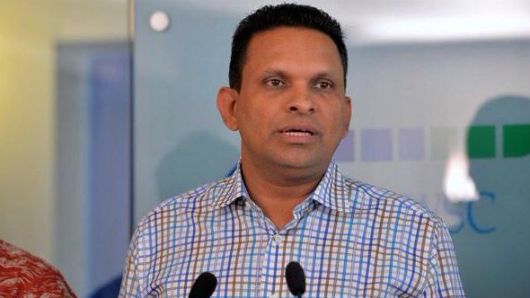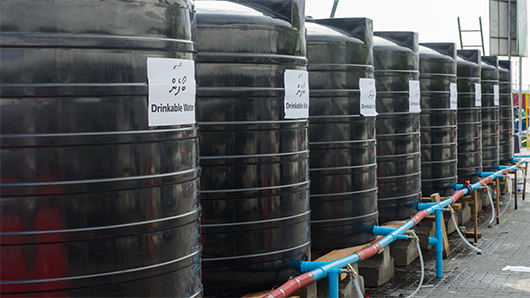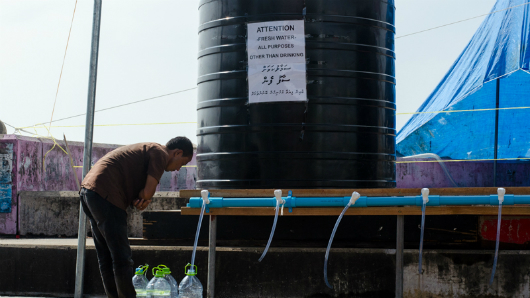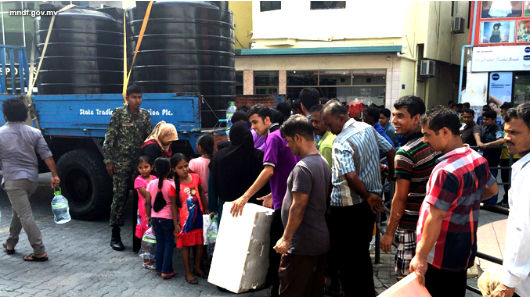The government has reversed its decision to impose a 10 percent import duty on staple foodstuff such as rice, flour, wheat and sugar, Minister of Tourism Ahmed Adeeb has revealed.
“Emergency economic council meeting ongoing where President [Abdulla] Yameen has just decided not to impose any duty on sugar, rice, flour (staple foods),” the council’s co-chair tweeted this morning.
Speaking at a press conference at the President’s Office later today, Adeeb said parliament and the Progressive Party of Maldives’ parliamentary group have since been informed of the decision.
“The president’s decision was made in light of requests from a lot of people as well as the current situation [with the capital’s water crisis] we are faced with,” he said.
Finance Minister Abdulla Jihad told parliament’s budget review committee last month that the government anticipated MVR533 million (US$34.5 million) in additional income from import duties.
The new duties were to represent 15 percent of the new revenue anticipated in the 2015 budget.
Revising import duties
Revising import duties was among several revenue raising measures in the record MVR24.3 billion (US$1.5 billion) state budget for 2015 currently before parliament.
Government-sponsored amendments (Dhivehi) to the Export-Import Act – which proposed raising custom duties from the current zero rate to 10 percent for staple foodstuffs – were subsequently submitted to parliament last month.
Scrapping plans to levy import duties on staple foodstuff from October 2015 was meanwhile among several amendments submitted to the budget by opposition Maldivian Democratic Party (MDP) MPs last week.
The minority party has issued a three-line whip for its MPs to vote against the budget if none of the proposed revisions are passed.
During last month’s parliamentary budget debate, opposition MPs strongly criticised the proposed tax hikes, contending that the burden of higher prices of goods and cost of living would be borne by the public.
The current administration’s economic policies – such as waiving import duties for construction material imported for resort development as well as luxury yachts – benefit the rich at the expense of the poor, MDP MPs argued.
In addition to a 10 percent tariff for oil, the government’s amendment bill also proposed raising custom duties for tobacco from 150 to 200 percent and raising the duty for a single cigarette to MVR1.25.
Additionally, a 20 percent custom duty would be imposed for luxury cosmetics and perfume and a 200 percent custom duty for land vehicles such as cars, jeeps, and vans.
The forecast for additional revenue for the 2015 budget was MVR3.4 billion (US$220 million), including US$100 million expected as acquisition fees for investments in special economic zones and MVR400 million (US$25.9 million) from the sale and lease of state-owned land.
The other measures included introducing a green tax of US$6 per night in November 2015 and leasing 10 islands for new resort development.
Tariffs were last revised in April this year after parliament approved import duty hikes for a range of goods proposed by the government as a revenue raising measure.
Targeting subsidies
Adeeb meanwhile told the press today that the government still planned to shift to a model of targeting government subsidies to the needy as part of efforts to consolidate public finances.
In his budget speech to parliament last month, Jihad also revealed plans to revise the electricity subsidy, which he said currently benefits the affluent more than the needy.
Targeting the electricity subsidy to low-income families or households would save 40 percent of the government’s expenditure on the subsidy, Jihad explained, and allow the government to provide a higher amount to the poor.
While Maldivians were not legally required to declare income and assets in the absence of an income tax, Adeeb said today that the National Social Protection Agency (NSPA) currently used criteria for means-testing for subsidies.
Minister of Economic Development Mohamed Saeed meanwhile noted that the International Monetary Fund (IMF) has recommended targeting subsidies and reducing recurrent expenditure to reign in the fiscal deficit.
“The electricity subsidy is one that goes to even the richest strata of society. Basic food subsidies are being enjoyed now by the resorts, and never mind the resorts, are being enjoyed by wealthy foreign visitors who stay at the resorts,” Dr Koshy Mathai, resident representative to Sri Lanka and Maldives, told MPs on the public accounts committee in February.
“That to us seems like a totally unnecessary policy.”
He added that “substantial savings” could be made from the budget by targeting subsidies to those most in need of assistance.
Meanwhile, in May, MMA Governor Dr Azeema Adam called for “bold decisions” to ensure macroeconomic stability by reducing expenditure – “especially the un-targeted subsidies.”
Related to this story
Finance minister presents record MVR24.3 billion state budget to parliament
Government proposes import duty hikes for oil, staple foodstuff
MDP, JP MPs propose 19 amendments to 2015 budget






